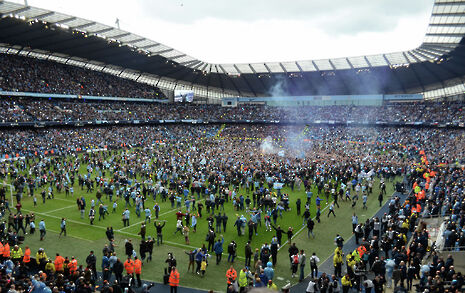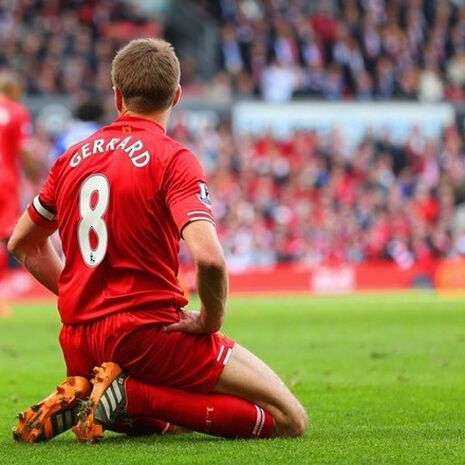Premier League Playoffs
Zack Case argues the case for bringing a playoff system to the Premier League
Let’s face it: the 2014/15 Premier League season has been dire. Of course it is unrealistic to expect the antics of Agueroooo’s last minute title winning goal in 2011/12 on a season-to-season basis, but Chelsea’s surge to the title has not even been mildly exciting. In fact they have been perched comfortably on top of the league table since August 30th for a record 274 days, winning it all with three matches to spare. And when things did become tantalising, Chelsea parked the bus. Boring, boring Chelsea. Boring, boring Premier League.

What were the highlights of the season? Well, there was Charlie Adam’s goal, Leicester’s ‘Great Escape’, John Carver (aka the best coach in the league) carving up his beloved a football club and Gerrard signing off. Yet, coming to think of it, there were remarkably few memorable matches which defined this campaign - though Leicester’s 5-3 upset against Manchester United does immediately spring to mind. The final day of the season can be seen as a neat microcosm for 2014/15 as a whole. ‘Survival Sunday’ was a grand anti-climax with Hull drawing and Newcastle winning, and all the other teams were already ‘on the beach’ with absolutely nothing to play for. It was virtually all over before it even began. A pundit on the final episode of Sky Sport’s ‘Sunday Supplement’ TV program claimed that his highlight of the season was Van Gaal’s end of season address – not even match related!
The Premier League is renowned for its excitement and competitiveness. “The best league in the world”, we call it; “there are no easy matches in the Premier League”, we claim. There is a large degree of truth in both of these statements. We are certainly spoiled with the most physical, end-to-end, unpredictable football matches around the world. It is no surprise that the Premier League recently secured an obscene TV deal worth over £5 billion – people want to watch it more than any other league. But at the end of the day this is no guarantee of entertainment at the end of every single season. And in football, entertainment is what everybody wants, all the time.
Naturally, some seasons are good, and some are bad. Let’s take a crude sample of the last five Premier League Seasons (only concerning the title winning teams, because people only remember who won the Premier League and not who secured the fourth place trophy, to the disappointment of Arsenal supporters):
2014/15 – Bad - Chelsea win by eight points
2013/14 – Good - Rise and Slip of Liverpool
2012/13 – Bad – Manchester United win by eleven points
2011/12 – Good – Aguerooooo
2010/11 – Bad – Manchester United win by nine points

The league tables do not lie. From a neutral perspective, the judgement of a season being ‘good’ or ‘bad’ depends on how close the title challenge is and whether such competition continues right up to matchday thirty-eight. Sometimes, as was the case this year, seasons have a tendency to trickle out as one team dominates and there is considerably less to play for. Of course teams may still be battling it out to secure European competition and avoid relegation, but these do not compare to competing for the title. A monotony of success is boring. Consider why men’s tennis has been in such a Golden Age over the last decade. Federer, Nadal, Djokovic, Murray: this is not a one man domination, but all these men are sure to compete with each other and are capable of beating each other. Competitive and unpredictable matches, compounded by an extremely high level of performance, are the most exciting, especially in the latter stages of any competition when the stakes are highest.
The Premier League over the last five seasons - and of course this applies to the league system more generally - has not guaranteed the most exciting matches on the final day of the season. This is what everybody who loves football wants. Yet there is a solution to end of season inertia; one which already exists right beneath the Premier League’s fingertips: the Playoffs. High stakes, high competition, high excitement. Those who say that there is “no better way to get promoted than via the playoffs” are spot on. The fact that the team who wins the playoff final receives a trophy (effectively the team who finishes third place in the league), whereas second place does not, only reinforces the point that the playoffs matter. A lot. Having said that, Arsenal fans might argue that third place does merit a trophy, regardless of winning a playoff final...

Like any season in memory, the Football League playoffs this year did not disappoint. The League Two final saw Southend United win a comeback penalty shootout victory against Wycombe Wanderers; Swindon Town vs Sheffield United in one of the League One semi-finals saw thirteen goals over two legs, including a 5-5 thriller. Even though the game itself was relatively dull, the attendance for the Championship playoff final (‘the richest game in football’, worth circa £120 million) at Wembley was practically a sell-out at 85,656. People attended this match because it was a cup final, the holy of holies in terms of excitement.
A playoff system should be applied to determine the Premier League winner, not only because it would provide the best defence against a season withering away but it would actually enhance the excitement of ‘the best league in the world’. Imagine a unique heavyweight clash to determine the title: Chelsea vs Arsenal, competing for it all. Imagine an underdog fairytale: Stoke City sneak into the playoffs to beat Chelsea in the playoff final. Both of these stories are paradigms for what sport is all about. The Premier League is notoriously gruelling and the long, hard slog to winning a title is highly rewarding as it is already. But a playoff system would add to our entertainment. Rather than being a marathon not a sprint, the season would become a marathon and then a sprint - the ultimate endurance test.
A tournament style race for the title would not deem the rest of the season worthless. In fact, fans would have the best of both worlds: the excitement of a long season with the goal to qualify for the playoffs and the excitement of a cup run to win it all in a Superbowl style game. There still will be exciting matches and defining moments throughout the ‘regular season’. The battle for the Champions League spots and the relegation dogfight would not lose any value. On that note, endorsing playoffs to determine relegation would perhaps be overkill. The end of the season for the bottom clubs already encapsulates a playoff scenario: six-pointers all the time, and the competition is always closely contested.
The most common argument against the playoff system is that it is unfair on the better teams. For example, in League One this season third placed Preston North End finished twenty points above sixth placed Chesterfield. This is not an entirely fair critique. End of year examinations act as a neat parallel: they more often than not are a sound indicator of performance throughout the year. A higher-ranking team should beat a lower-ranking team, just like a candidate who performs well throughout the year should perform well in his or her exams. Preston North End were promoted this year, winning 4-0 in the playoff final. In this instance, the league table did not lie.
Having said that, evidently the better team does not always win (that’s why we love sport) nor does the best student always have the highest exam results (that’s why we hate exams). However, there is a response to the ‘exam’ argument. We need to look to America, where all sports are determined by the playoffs and nobody has any problem with that, for a Premier League solution. There first of all needs to be a bye to the next round for the top two seeds; a more rested squad is more likely to outperform a jaded squad, especially at the end of a season. And instead of two-legged quarter/semi-finals, single ties should be played at the home stadium of the higher seed – home field advantage is always a factor in sport. These are significant advantages for the teams that finish higher up; this is fair game.
An ideal six-team playoff should work like this: the first and second placed teams earn a bye, while the next four teams play each other (third vs sixth and fourth vs fifth) in order to determine who is to play the first and second seed in the next round. The highest seed always plays against the lowest seed at their home stadium, until the final which is to be held at Wembley. Simple, isn’t it?
I am advocating this not because the Premier League is boring on a game-to-game basis, nor because a playoff system would give Arsenal a better shot at winning the title. I want to see the playoffs in the Premier League because I am jealous of the Football League at the end of some seasons. Football is about excitement, generated by high stakes, unpredictable matches, good quality of performance and most of all by competitiveness. Playoffs as the climax of the season provide excitement in abundance. Guaranteed.
 News / Caius mourns its tree-mendous loss23 December 2025
News / Caius mourns its tree-mendous loss23 December 2025 Comment / Yes, I’m brown – but I have more important things to say22 December 2025
Comment / Yes, I’m brown – but I have more important things to say22 December 2025 News / Cambridge welcomes UK rejoining the Erasmus scheme20 December 2025
News / Cambridge welcomes UK rejoining the Erasmus scheme20 December 2025 News / CUP announces funding scheme for under-represented academics19 December 2025
News / CUP announces funding scheme for under-represented academics19 December 2025 News / King appoints Peterhouse chaplain to Westminster Abbey22 December 2025
News / King appoints Peterhouse chaplain to Westminster Abbey22 December 2025









